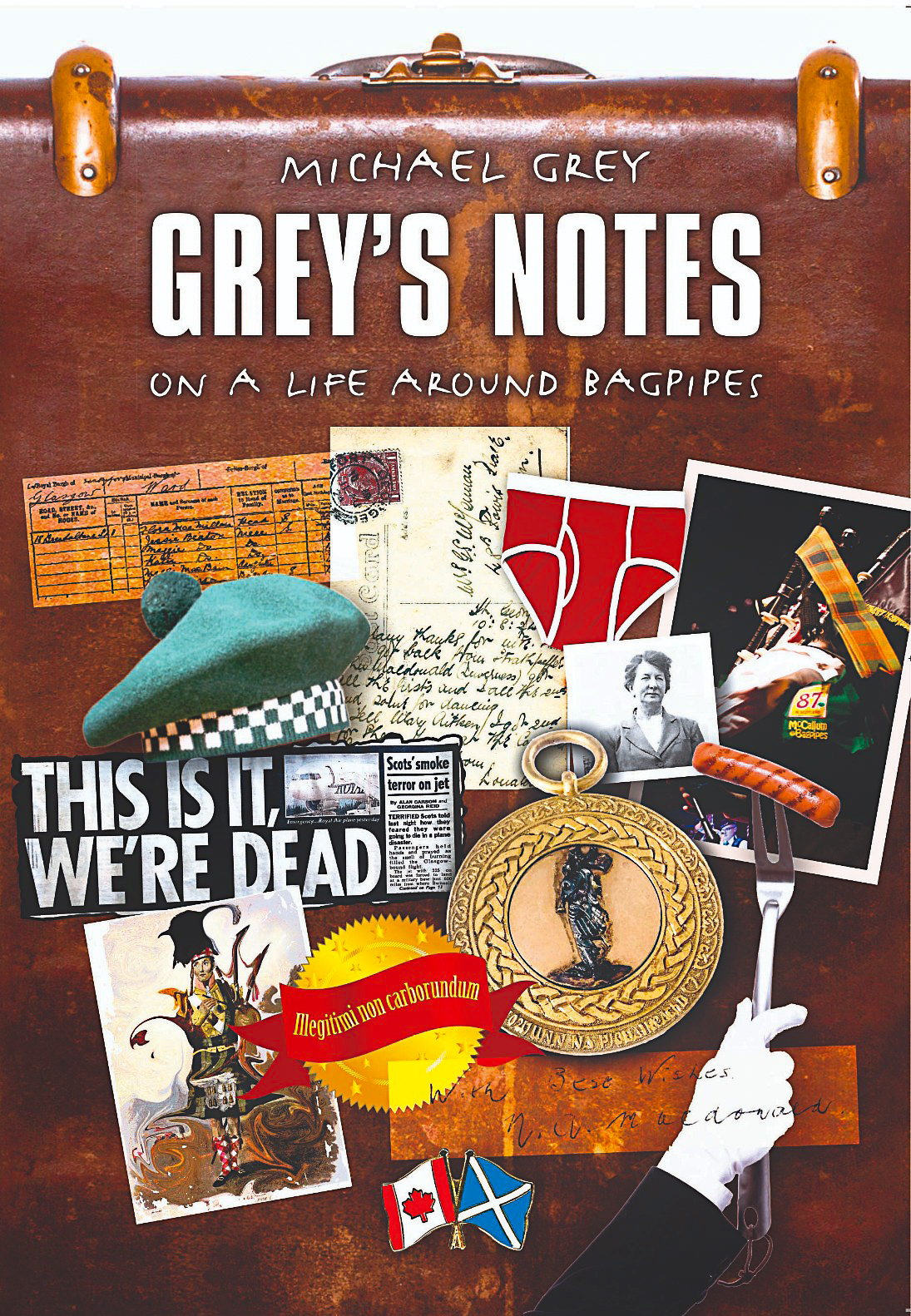Idiomatica
June 20, 2009 on 10:36 am by Michael Grey | In Music, Pipe Bands, Tips, Video | 6 CommentsIdiomatica. A bit of a poncie sort of self-conscious name for a medley, isn’t it. But what fun to say – and play. I feel confident saying that the Toronto Police Pipe Band had a great, if not challenging, winter of practice shaping this puppy up (as Pete Aumonier might say). And If anyone had any doubt about the degree of serious intensity most of the pipe band world takes pipe band music you only have to look to the internet. Yikes. Reading a sampling of the voracious and sometimes downright bitter opinion Idiomatica elicited made me think the Toronto Police Pipe Band might’ve had a cheerier response had we marched on the field and pulled a Sinead (publically rip up a photo of the Pope). Either that or offer the world the 7,864th medley that starts with a marchpipe.
Regardless: the crowd on the field was hugely positive. I think moving forward pipe bands will find that matters more and more.
For anyone interested the name was inspired from the score sheet musings of the ensemble adjudicator at last year’s world’s qualifier: he scrawled, “not playing in the Scottish idiom“.
I think, like some of you, that the percussion accompaniment really makes the thing work. And, surprise, regardless of what bubbleicious1989 thinks, I really think the thing works. Drum Sergeant, Doug Stronach, bassist Reagan Jones and the whole percussionista group constructed inspired and appropriate scoring making great use of space.
Most pipe band people like their musical space jam-packed with clearly audible sound; lots and lots of notes – everywhere. Without “content” as I hear drummers call all them notes, there is no viable accompaniment. Like silence between two new acquaintances, rests or, open space (or “open real estate” as the drumming adjudicator wrote at last week’s contest), is generally uncomfortable for pipe bands. I hope that perspective changes.
One of the most common and ill-informed comments heard around is, “I can’t judge it if I can’t hear it” — usually said in reference to percussion rests in performance. Someone said, “silence is the best of all musical states”. Maybe. Maybe not. Regardless, I know silence in performance is not easy. Perfectly placed silence, or rest, is surely one of the most important and difficult elements in music. It takes a seriously deft hand to pick the right points in time to halt sound and accent melody with rest. A thought to be explored another day.
It’s becoming increasing clear to me that had we submitted “Idiomatica” as a group of named melodies – perhaps “sections” would be a less presumptive word since so many felt it amelodic – the performance would have been perceived very differently and less audacious.
Idiomatica is a medley freely assembled in the style of the band’s choosing. Like any other band in the contest, it is one group’s expression of a medley. A medley of melodies, one that starts off in one planned place and ends in another.
In orchestrating medleys, we can rest and be thankful.
M.
6 Comments
Sorry, the comment form is closed at this time.
Dunaber is using WordPress customized and designed by Yoann Le Goff from A Eneb Productions.
 Entries and comments
feeds.
Valid XHTML and CSS.
Entries and comments
feeds.
Valid XHTML and CSS.



I just completed a lengthy response on Bob Dunsire forums to the Pipe Bands > New Age Medley! thread. In the end, congratulations for the Idiomatica medley (or whatever it is). Challenging, interesting and entertaining are adjectives that come to mind. I pose the question in my Dunsire post… if this format was to become the norm, how many composers are there out there who could (or would have the time) to produce one of these babies every season or two? Mike, I’m curious about the time it took to compose and arrange your *big* works? Could you do it consistently? How many people out there, in your opinion, could? Is this only the business of top tier bands (ie, Grades 1 or 2) before it starts to become an exercise in musical futility? There are lots of questions spinning around in my head BUT, it doesn’t change the fact that I love what you are doing! — Stephen (PS: Perhaps head of to Dunsire and add your 2c worth there Mike?)
Comment by srmdrummer — June 21, 2009 #
Thanks very much for your good – and interesting – words, Stephen. It’s hard to put a standard number around time required to compose anything, let along a medley using this approach. I’d guess somewhere between 40-80 hours. Maybe less. There’s a lot of thinking time rolled in that number. And probably the same amount of time to create the percussion accompaniment scoring. I have no idea how many could do this but I will say that based on what we hear performed in competition there is zero interest in taking this approach. Surely we’d hear evidence of interest if there was any inclination amongst pipe bands to look at a holistic expression of a medley. I’d guess that where there’s a will, there’s a way. It’s the first part of that proverb that’s missing. M.
Comment by mike — June 22, 2009 #
Mike – I can not thank you enough for having the balls to just put this out there in a competitive setting! Have faith in yourself as a pioneer because this is the inevitable direction in which premier pipe bands are moving, even in competitive environments.
Whether you are a professional player or a casual observer, the current paradigm of “acceptable” pipe band competition repertoire, both sets and medleys alike, has been absolutely beaten to death and stretched nearly to its breaking point. There can be no doubt that playing sets build good technique and discipline, but that doesn’t mean its the only thing we should play.
All the top bands have been experimenting for years with alterations of time signature, complex 3 part harmony, and even some counterpoint! Last year even Shotts used a plastic air tube at the worlds to change the pitch of the tenor mid-performance!
Back in the 70s and 80s moving to a medley format was a big deal that traditionalists opposed…they got over it and the pipe band world was consequentially better served. Especially considering the increasing ratio of top notch “foreign” bands to Scottish bands (only 3 of the top 7 are Scottish, top two are Irish and Canadian) the evolution of the pipe band idiom (something that has never been static) will concordantly accelerate.
The bottom line is that top level grade one bands have more potential, talent, and musical creativity than the current medley format can express and since the majority of the populace only knows of the pipe band through exposure at highland games it makes little sense (at least to me) to only showcase the true versatility and musicality of the pipe band at concerts whose attendance is composed of 95% pipers and drummers.
The only substantive roadblock i can foresee (excluding stuffy conservative members of the RSPBA of course) is the concern that Stephen brought up about there not being enough composers who could write a selection like that every year for all the grade one bands. Though I certainly don’t claim to be an expert on the subject, i can only think of a handful off the top of my head (Bill Livingston, Don Bradford, Mark Saul, Rob Matheson, Bruce Gandy, maybe Ryan Canning or Chris Armstrong) who could consistently produce work of that caliber and of course there are far more grade 1 outfits than that.
I would hope, that if the tectonic plates shifted and the rules were changed, that a variety of young composers would step up to the plate. As long as you keep doing what you are doing I am optimistic that the critical mass/tipping point will arrive sooner than you think. I also agree with your sentiments about audience reaction and comparative enthusiasm being of central importance.
I would be interested to hear your thoughts on what would be the most effective and efficient methodology for attaining the “will” as you put it.
In any case, cheers to a gutsy performance! Cant wait to hear it played in Glasgow.
James
Comment by jamesfaeh — June 28, 2009 #
Thanks for your comments, James. It looks like we’re of the same mind on this. Regarding the dearth of composers: I believe hidden out there are able composers unknown to most of us. Perhaps we’ll see. In the meantime, what’s wrong with bands commissioning medleys? Its the done thing in popular and classical music worlds (performers commissioning or hiring song-writers, etc). I’d be completely open to that (if anyone is interested). Off to band practice now – time for a walk on the wild side 😉 M.
Comment by mike — June 28, 2009 #
10 out of 10 for doing it! It’s certainly a way to go. I appreciate how difficult it must be to learn this type of stuff.
Despite that it leaves completely cold. Even after hearing it 4-5 times I’m still wondering what I’m listening to. Confusion and lack of coherence is what it presents to me. I sure a written statement about what this is all about would help. P|D has done this before.
Sorry about this but I do feel that this performance place me in line with those that thought Bobbie Cuthbertson was a bit over the top.
Comment by Stig Bang-Mortensen — July 5, 2009 #
Thanks for your comments, Stig. I am not sure a written statement or explanation would warm this music up for you – or anyone else who finds it confusing, incoherent or cold. I do like that it made you feel something. No need for any apologies about not liking it. You’re note was dignified, respectful – and signed. What a breath of fresh air on the internet! M.
Comment by mike — July 5, 2009 #